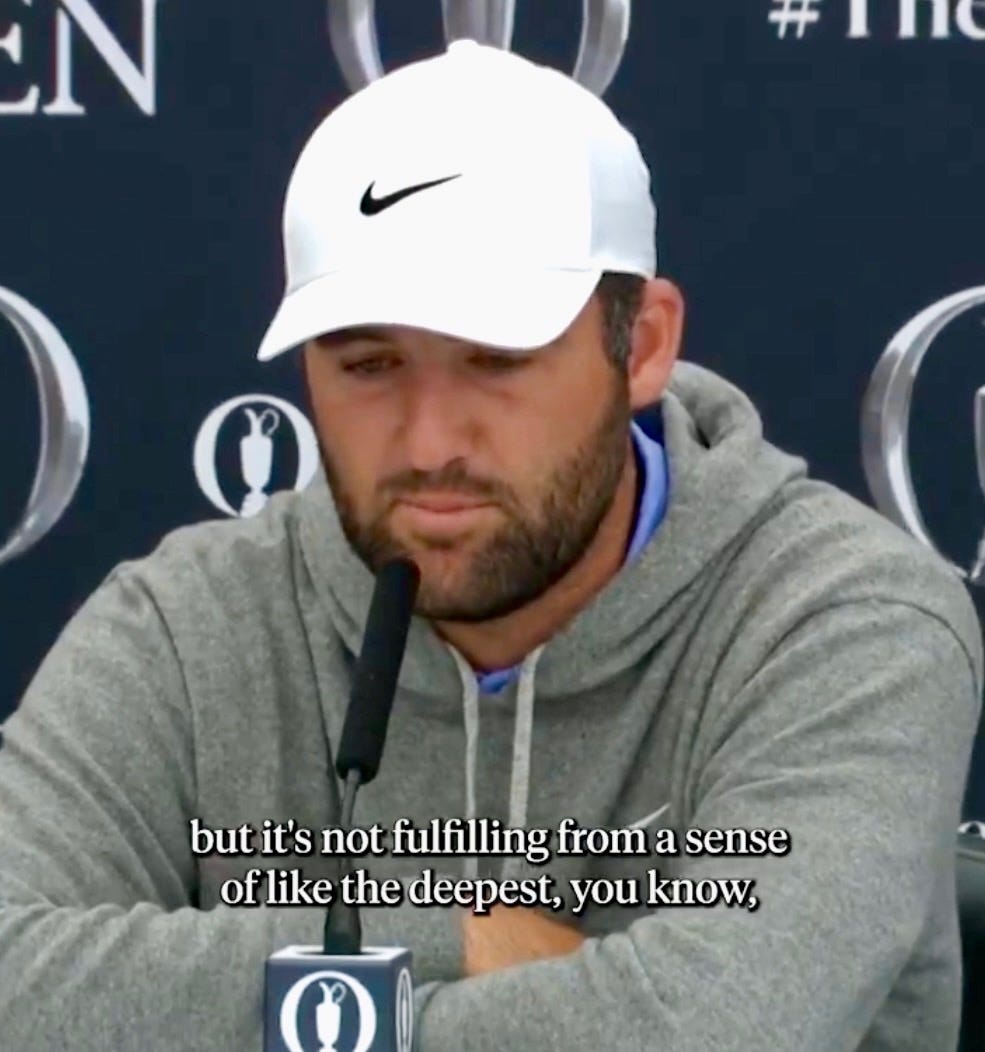Scottie Scheffler, The Arrival Fallacy, and the Art of Doing Hard Things
There is no greater trap than thinking that the accomplishment of some goal will fulfill you—but the process of going after it just might.
Earlier this week, the number one golfer in the world called winning major championships “not fulfilling.”
It's making headlines in the sports world, and people are sensationalizing his comments. But what we actually saw is someone who is the best in the world showing that he's still human, and articulating it in a direct way.
There is no greater trap than thinking that the accomplishment of some goal will fulfill you. What will fulfill you is who you become in the process of going for it.
Despite two Masters wins and a PGA Championship before turning 30, Scottie Scheffler was honest as to what he finds empty about reaching the mountaintop of his sport in a recent press conference.
"This is not... fulfilling," Scheffler said.
"It's fulfilling from the sense of accomplishment, but [winning] is not fulfilling from a sense of the deepest places of your heart," he went on. "It feels like you work your whole life to celebrate winning a tournament for like a few minutes... It only lasts a few minutes."
It’s hard for most of us to imagine how that could possibly be true.
How do you dedicate your whole life to standing on a podium, wearing a green jacket, or raising a trophy, only to feel empty by the time your head hits the pillow?
Scottie Scheffler is describing the arrival fallacy, a concept I've written about (and experienced) extensively: Wherever you are, the goalpost is always 10 yards down the field. If you develop a mindset: “If I just accomplish _____, THEN I’ll arrive,” you are in for a rude awakening.
There is no arriving. The sooner you realize this, the better. It’s true for Scottie Scheffler, and it’s true for anyone going after a significant goal.
Win gold, you are on the medal stand for 3 minutes, and celebrate for a few weeks. Get a big promotion, you feel good about it for a day or two before it’s time to work again. Hit the New York Times bestseller list, you toast to your success, maybe even frame it and put it on the wall. But staring at a cut-out from a newspaper eventually gets boring.
I thought I'd be content after my book became a national bestseller. That lasted about half a day before I was asking how I could make the New York Times list, too. Recently, I hit a PR deadlift: 520 pounds, which for me is a big lift. I remember thinking I'd order my favorite pizza to celebrate and maybe shift away from that kind of training for a bit. It was four minutes before I was thinking about what it'd take to hit 550. (I know this, because I didn't even take up the full five-minute rest interval.)
The human brain is wired to want more. We are suckers for the chase. We struggle to be content. The neurochemical associated with wanting (dopamine) is much stronger than the neurochemical associated with liking (serotonin).
Back on the Savannah, our ancient ancestors who became content got selected out whenever there was a famine. Those who were constantly on the lookout for more and better opportunities, who were never satisfied for too long, they were the ones who survived and passed on their DNA—and that chain runs all the way down to us, today. So we really did evolve to strive and not be content. It's in our nature. It's a gift and a curse. It's the source of innovation and progress and growth, and also of longing and emptiness.
But becoming aware of the arrival fallacy should not be a downer. It is actually supremely freeing! You no longer expect accomplishment or achievement to fulfill you. Instead, you start doing everything you can to find happiness, fulfillment, and energy in the process of pursuing your goals rather than having false expectations about what will happen when you do (or don’t) attain them.
We spend 99.9999 percent of our lives in the process. The results are mere blips in time. If you want to find fulfillment, then you’ve got to find it in the striving itself. The “point” in the last sentence of the quote below is found in the few sentences that come before it:
It's okay to be ambitious, to want to achieve. Just like Scottie Scheffler wants to win Major Championships, I want my books to hit bestseller lists. I don't hide it. I push hard for it. And that’s great! I think you should push hard to achieve your goals, too.
It's just that we've got to realize that no achievement will be as satisfying as the effort that went into it. That's why it's so critical to find joy, meaning, and satisfaction in the process. To soak up the good moments along the way. To find joy in the relationships you forge. To inspire others and be inspired. To be of service— to help, mentor, teach. To have fun doing the hard work.
In the words of the great Robert Pirsig: "There is no zen on the tops of mountains. The only zen you find on the tops of mountains is the zen you bring up there."
The Art of Doing Hard Things
We increasingly live in a bifurcated friction economy.
For some people, life includes little friction. It’s not to say life isn’t hard, but there’s simply not much to push up against. For other people, life includes constant friction—night shifts, buses to catch, Medicaid forms to fill out in order to get dental work covered, and so on. (For more on friction, this piece by
It’s worth acknowledging that telling people in the latter group to “do hard things” probably falls on deaf ears, and for good reason. But for everyone else, it’s often not too few hard things that is the problem. It’s actually a lack of hard things.
A life without any friction sounds nice. But in reality, it’s not. The author
covered this in his 2021 book, The Comfort Crisis, and it’s only gotten worse since.Technology lets us date, order food, shop, scroll, and work all from the same small screen. You are always just one click away from making a decision or reversing it. You never really have to put yourself out there. It’s an existence without much struggle, but also without the satisfaction you gain from overcoming struggle.
But the hard things you voluntarily take on ought to be meaningful. And this is where so much of the conversation on this topic gets lost and sidetracked. Suffering for the sake of suffering makes no sense. The goal is to find worthwhile challenges. Challenges that help you grow into the person you want to become.
For people living a low-friction life, there’s a temptation to manufacture discomfort with cold plunges or boot camps where you pay to get yelled at as if you’re in the Marines. In most cases, there’s nothing wrong with these things, but they’re not the thing. They’re a bridge to the thing.
If 30 days of cold plunges helps you build discipline, helps you prove to yourself that you can commit to showing up and being uncomfortable in service of a broader goal, and then you carry that grit into showing up as a better parent, partner, athlete, neighbor, musician, or artist—that’s the point.
These challenges aren’t the destination. They’re practice. They build muscle for the stuff that actually matters.
Do hard things, yes. Absolutely. But make sure they’re the right hard things. And realize that there’s a difference between performative hard things and real hard things:
Staying calm during difficult conversations
Showing up when you don’t feel like it
Doing meaningful work
Taking ownership of your health
Training for something that matters to you
Stepping into the arena when you could fail
Being there for people
If all you are doing is cold-plunging and it’s not working in service of your values or goals—or worse yet, it’s getting in the way or exhausting you—then it’s no longer worth doing.
Research shows our stress response is mediated by whether or not a challenge is voluntarily chosen and meaningful. If we view what we are doing as meaningful then we adapt and grow from the challenge. If not, the same challenge exhausts and depletes us. Suffering for the sake of suffering makes no sense. The goal is to have meaningful activities that ladder up to the person you want to become.
For some, doing hard things means a physical challenge such as training for a marathon or deadlift. For others it’s learning a new skill such as guitar or how to paint. It could also be a meditation retreat. Or, indeed, a cold-plunge.
The litmus test: am I suffering for suffering’s sake, or do I find this meaningful because it supports my values and goals?
Remember that a frictionless life is one of endless convenience, but it lacks meaningful strain. A good life requires the right kind of strain—chosen, worthwhile, and aligned with your values and goals. These are the ‘hard things’ that add texture to your life and help you to become a better version of yourself.






Again a very well written. For me I am struggling or beginning to question on things or activities I assign meaning to? Sometimes I assign meaning to stuff because everyone else assigns it like earn more money and that would require change in jobs which will add extra commute and less time with family, so there is a cost. Anyways looks like one needs to be careful about things they assign value to...thanks again